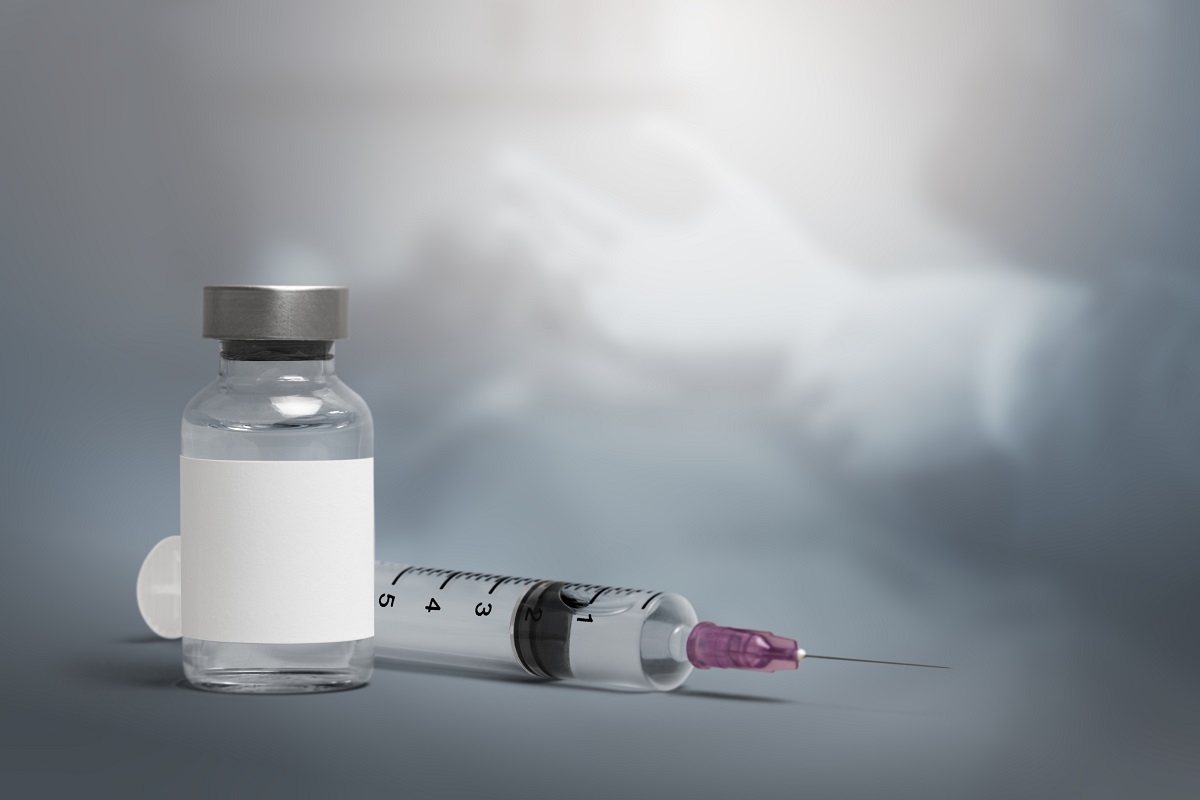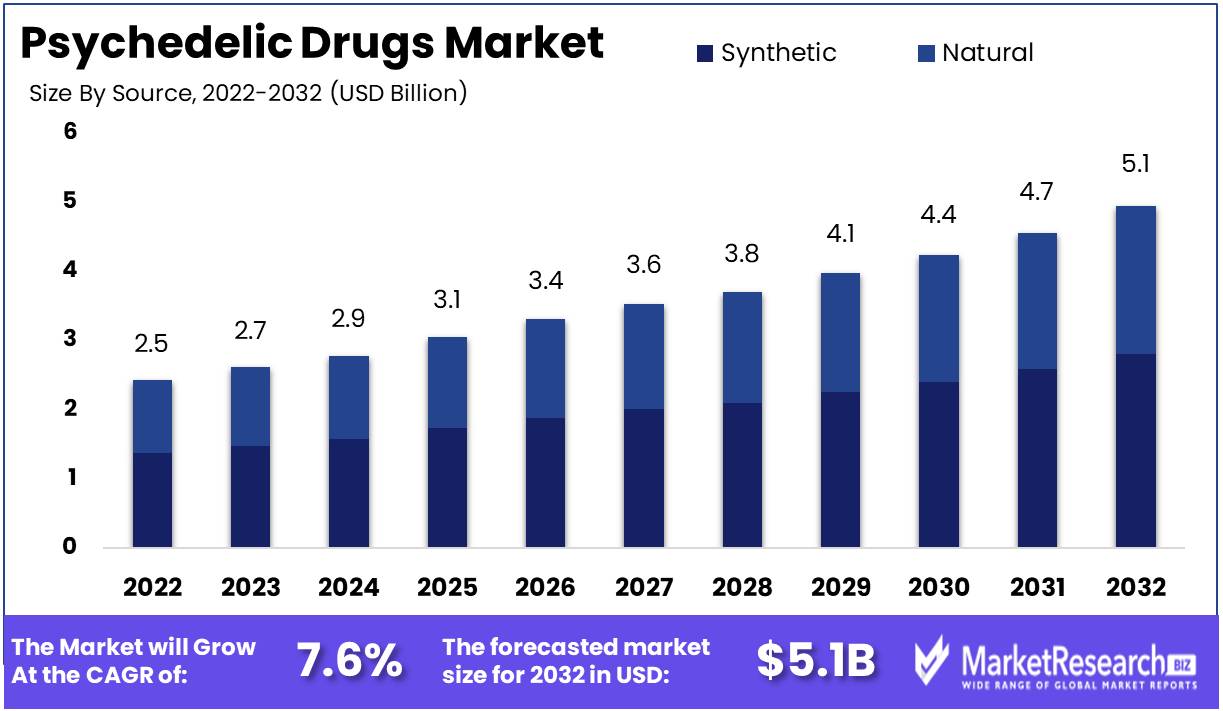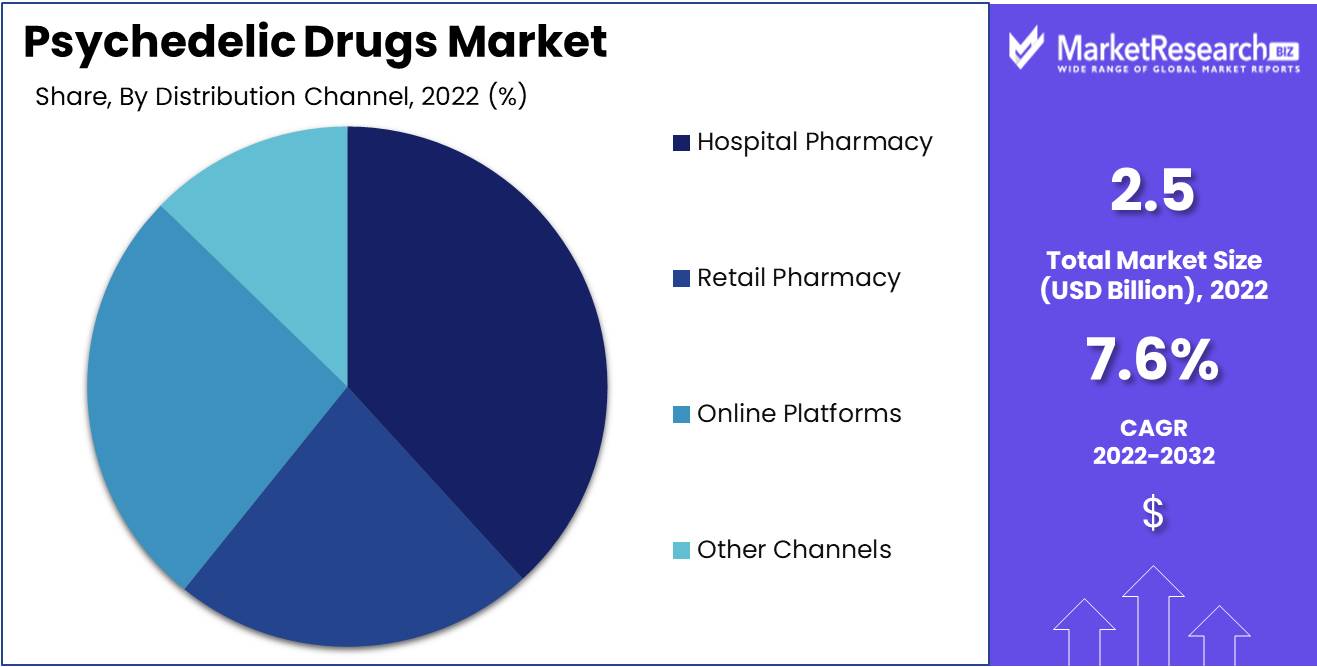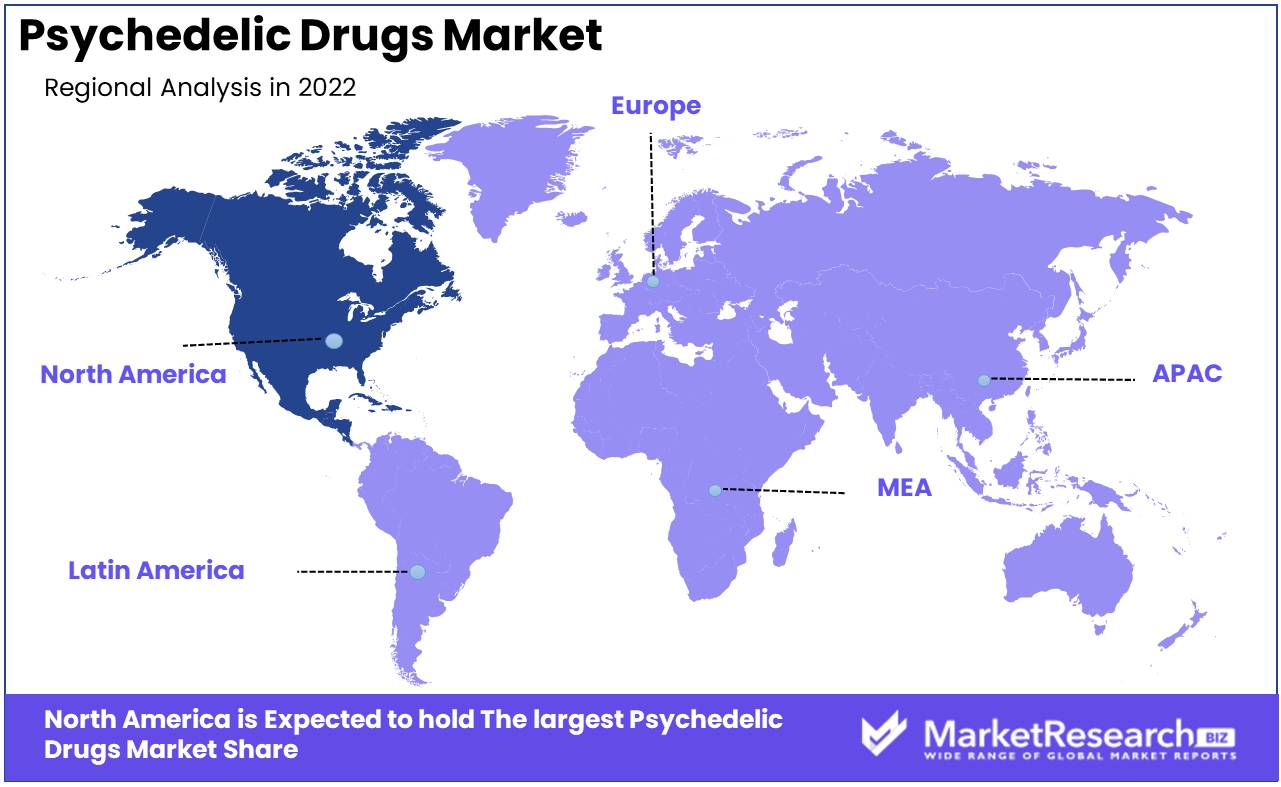
Psychedelic Drugs Market By Source (Synthetic, Natural), By Distribution Channel (Hospital Pharmacy, Retail Pharmacy, Online Platforms, Other Channels), By Region And Companies - Industry Segment Outlook, Market Assessment, Competition Scenario, Trends, And Forecast 2023-2032
-
40160
-
July 2023
-
189
-
-
This report was compiled by Correspondence Linkedin | Detailed Market research Methodology Our methodology involves a mix of primary research, including interviews with leading mental health experts, and secondary research from reputable medical journals and databases. View Detailed Methodology Page
-
Report Overview
Psychedelic Drugs Market size is expected to be worth around USD 5.1 Bn by 2032 from USD 2.5 Bn in 2022, growing at a CAGR of 7.6% during the forecast period from 2023 to 2032.
Over the past few years, the psychedelic drugs market has experienced rapid growth and captivated interest. It encompasses a range of substances known for their hallucinogenic effects on the human mind, some derived from plants while others are synthesized in laboratories. Initially linked to counterculture movements and spiritual quests, these substances are now garnering attention for their potential therapeutic and medicinal applications.

The significance and advantages of this market are becoming increasingly apparent. Studies and anecdotal evidence indicate that certain psychedelic substances, when used responsibly and under controlled conditions, may have profound effects on mental health. They show promise in treating various mental health disorders, such as depression, post-traumatic stress disorder (PTSD), and addiction. Moreover, these substances are believed to foster personal growth, spiritual exploration, and enhanced creativity.
Industries investing in the psychedelic drugs market are diverse, ranging from pharmaceutical companies to mental health providers and startups. Traditional pharmaceutical companies are backing research efforts and funding clinical trials to develop psychedelic-based medications. Meanwhile, wellness companies and holistic health practitioners are integrating psychedelic experiences into their offerings, aiming to provide alternative solutions for mental health and personal growth.
Major drivers of the psychedelic drugs market include the growing recognition of mental health as a global crisis and the limitations of current treatment options. Conventional medications for mental health disorders often fall short of providing long-term relief, leading to a demand for alternative modalities. Additionally, the growing body of scientific evidence supporting the safety and efficacy of psychedelic substances has fueled interest and investments in this emerging market.
As the psychedelic drugs market grows, ethical concerns and responsible practices become paramount. The industry emphasizes transparency, explainability, and accountability in research, development, and treatment protocols. Regulatory frameworks are being established to ensure the safety and ethical use of these substances, mitigating potential risks and protecting individuals from exploitative practices.
Driving Factors
Increasing Acceptance and Research on the Therapeutic Potential of Psychedelic Drugs
The psychedelic drugs market has witnessed significant growth in recent years due to the increasing acceptance and understanding of the therapeutic potential of these substances. Previously considered illicit drugs with no medical value, psychedelics are now being recognized for their potential in treating mental health disorders such as depression, anxiety, PTSD, and addiction.
Growing Mental Health Concerns and Treatment Gaps
Psychedelic-assisted therapies offer a novel approach to addressing mental health disorders. The visionary and transformative experiences induced by psychedelic substances can help individuals gain new perspectives, enhance self-awareness, and promote emotional healing. By targeting the root causes of mental health issues rather than merely managing symptoms, psychedelic therapy has the potential to revolutionize the field of mental health care.
Relaxation of Regulatory Restrictions and Clinical Trial Approvals
Another driving factor behind the growth of the psychedelic drugs market is the relaxation of regulatory restrictions and the increasing number of clinical trial approvals. Recognizing the potential benefits of psychedelic therapies, regulatory bodies are starting to reconsider their stance on these substances. The Phenylketonuria challenge spurs innovation in the psychedelic drugs market, exploring novel treatments for cognitive and neurological disorders.
Expansion of Psychedelic-Assisted Therapies and Wellness Practices
The recognition of psychedelic drugs' therapeutic potential drives a rapid expansion of the market for psychedelic-assisted therapies and wellness practices. Combining traditional psychotherapy with psychedelics amplifies the healing process, providing patients with profound transformative experiences. Globally, clinics and wellness centers are emerging to offer safe, controlled environments for guided psychedelic sessions supervised by professionals. Integration of mindfulness, meditation, and supportive techniques further enhances these therapies' benefits. Psychedelic substances like psilocybin, MDMA, and LSD are increasingly accepted and integrated into mainstream mental health care, sparking a paradigm shift in mental disorder treatment.
Restraining Factors
Legal and Regulatory Complexities in Some Jurisdictions
The psychedelic drugs market has drawn significant attention for its therapeutic potential, but legal complexities hinder its growth. These substances are classified as controlled substances in many countries, restricting research, clinical trials, and market availability. Varying laws between countries and states add further challenges, impeding companies in this market. As a result, the full potential of psychedelic drugs in treating mental health disorders like depression, anxiety, and PTSD remains largely untapped, limiting access to alternative therapeutic options for those in need.
Potential Safety Concerns and Abuse Risks
Psychedelic drugs show promise in clinical settings, but safety concerns and abuse risks hinder their market. Psilocybin, LSD, and MDMA can cause therapeutic effects, yet improper use poses dangers like adverse reactions and worsening mental health. Recreational misuse also leads to societal harm, complicating regulation and acceptance for therapeutic purposes. Education, responsible use, and effective regulation are vital to address these concerns.
Limited Availability of Approved Psychedelic Drugs
The restricted availability of approved psychedelic drugs poses a significant obstacle to market growth and accessibility. Only a few psychedelics, like ketamine and psilocybin, have limited approval in specific regions. Obtaining regulatory approval for new substances is a complex and time-consuming process, involving rigorous clinical trials and safety evidence. This delays the introduction of new treatments, limiting options for patients. Additionally, it hampers research and innovation, hindering the development of effective mental health disorder treatments.
Potential Stigma and Social Barriers
Public perception and societal attitudes towards psychedelic drugs impede their mainstream medical acceptance due to misconceptions, fear, and limited understanding of their therapeutic value. This stigma deters patients, healthcare providers, and investors from engaging with the psychedelic drugs market. To overcome these barriers, education and awareness campaigns are essential in dispelling myths. Additionally, ongoing research and evidence-based studies on their therapeutic benefits can alter public perception and foster a more supportive environment for their wider acceptance and market growth.
Potential Challenges in Drug Manufacturing and Quality Control
The psychedelic drugs market faces unique challenges in manufacturing and quality control due to their distinct nature. Ensuring purity and consistency requires specialized processes, and any discrepancies could endanger patient safety. Scaling production while maintaining quality is also difficult. Solving these issues demands investments in research, technology, and regulatory support to meet the growing demand for standardized and high-quality psychedelic drugs, vital for market reputation and growth.
Source Analysis
The market for psychedelic drugs is witnessing a significant shift, with the synthetic segment dominating the market. This is attributed to various factors, including economic development in emerging economies, consumer trends and behaviors, and the anticipation of the fastest growth rate in the forthcoming years.
The synthetic segment has emerged as the dominant player in the psychedelic drugs market. Synthetic drugs are artificially created in laboratories, offering manufacturers greater control over their composition and effects. These drugs are known for their hallucinogenic properties, leading to altered perceptions and experiences. With advancements in synthetic drug manufacturing techniques, the availability and accessibility of these substances have increased, leading to their domination in the market.
The rise of the synthetic segment in the psychedelic drugs market can be attributed to the economic development observed in emerging economies. These nations are currently undergoing rapid growth and urbanization, which has led to higher disposable incomes and improved living standards for their citizens. Consequently, people in these economies have increased access to recreational drugs and are more open to experimenting with psychedelic substances, contributing to the growing adoption of the synthetic segment in the market.
Consumer behavior towards the synthetic segment in the psychedelic drugs market is driven by various factors. Firstly, the desire for unique and novel experiences pushes individuals to explore hallucinogenic substances. The synthetic segment offers a wide range of synthetic psychedelic drugs, each providing a distinct experience. Additionally, the growing acceptance and normalization of drug use in certain social circles have contributed to the increased demand for the synthetic segment. Consumers, particularly among the younger generation, are more open to experimenting with these substances.
Distribution Channel Analysis
The various segments are involved in the distribution and dispensing of psychedelic drugs, the hospital pharmacy segment holds the largest market share. In the context of the psychedelic drugs market, the hospital pharmacy segment refers to the pharmacies operating within hospitals or medical institutions that dispense these drugs to patients. This dominance could be attributed to several factors, such as the increasing medical use of psychedelic drugs for treatments, the stringent regulations around their distribution, and the preference for supervised administration in a clinical setting.
The adoption and growth of the hospital pharmacy segment in the context of the psychedelic drugs market are being fueled by economic development in emerging economies. As these economies experience growth and improvement in their healthcare infrastructure, there is an increased demand for quality medical services, including access to specialized pharmaceuticals. This, in turn, drives the need for hospital pharmacies to stock and dispense psychedelic drugs as part of medical treatments.
The prevailing patterns and attitudes of consumers in relation to the hospital pharmacy segment of the psychedelic drugs market. Consumer trends and behaviors encompass factors such as patient preferences for obtaining psychedelic drugs from hospital-based pharmacies, the trust placed in medical institutions for drug dispensing, and the perception of safety and efficacy associated with supervised administration. Understanding these trends is crucial for market players to align their strategies and cater to the demands and expectations of consumers effectively.

Key Market Segments
By Source
- Synthetic
- Natural
By Drug Type
- Gamma Hydroxybutyric Acid (GHB)
- Ketamine
- Psilocybin
- Lysergic Acid Diethylamide (LSD)
- 3,4-Methylenedioxymethamphetamine
- Other Drug Types
By Application
- Treatment-Resistant Depression
- Opiate Addiction
- Post-Traumatic Stress Disorder
- Narcolepsy
- Panic Disorders
- Other Applications
By Distribution Channel
- Hospital Pharmacy
- Retail Pharmacy
- Online Platforms
- Other Channels
Growth Opportunity
Leveraging Technological Advancements for Enhanced Treatment Efficacy
Technological advancements present a promising opportunity for the psychedelic drugs market to enhance treatment efficacy. Utilizing digital health solutions can revolutionize psychedelic therapies, making them more accessible and effective through personalized treatment experiences, real-time monitoring, and data-driven insights. Immersive virtual reality (VR) and augmented reality (AR) platforms enable patients to undergo emotional healing, self-reflection, and personal growth. Integrating these technologies into treatment modules can lead to improved patient outcomes and further contribute to the industry's growth potential.
Developing Comprehensive Insurance Coverage for Psychedelic Therapies
One significant obstacle hindering the widespread adoption of psychedelic therapies is the lack of comprehensive insurance coverage. As the acceptance of psychedelic drugs increases, businesses can work towards collaborating with insurance providers to develop comprehensive coverage plans for psychedelic-assisted treatments. By addressing this issue, businesses can unlock a vast market potential, allowing a more significant number of individuals to access these transformative therapies. Moreover, such collaborations can create a favorable environment for research institutions and healthcare providers to conduct clinical trials and treatment development, further driving growth in the psychedelic drugs market.
Strategic Partnerships with Indigenous Communities and Ethnobotanists
The indigenous knowledge and practices surrounding psychedelics have been harnessed for centuries by various communities worldwide. To leverage this vast reservoir of knowledge, businesses in the psychedelic drugs market can establish strategic partnerships with indigenous communities and ethnobotanists. Such collaborations can facilitate the sustainable production of psychedelics, while also ensuring the preservation of cultural heritage and respecting traditional practices. Working together with these communities can not only create a mutually beneficial relationship but also strengthen the market's growth potential by incorporating a diverse range of perspectives and promoting socially responsible practices.
Latest Trends
The Expansion of Psychedelic-Assisted Therapies
In recent years, there has been a significant increase in interest and recognition among researchers and medical professionals regarding the potential transformative effects of psychedelic-assisted therapies. Multiple clinical trials have provided evidence of the efficacy of these interventions in the treatment of diverse mental health disorders, including but not limited to depression, post-traumatic stress disorder (PTSD), and addiction. The outcomes have been exceedingly noteworthy, as numerous patients have reported enduring advantages and enhanced quality of life.
Utilization of Ketamine Therapy for Treatment-Resistant Depression
Ketamine, once primarily known as a dissociative anesthetic, has recently emerged as a breakthrough therapy for treatment-resistant depression. Its rapid-acting antidepressant effects have transformed the lives of many individuals who have exhausted all other treatment options. Ketamine therapy offers a glimmer of hope for those who have struggled for years with severe depression, offering them the chance to regain control of their lives.
Rise of Microdosing Practices and Wellness Applications
Microdosing, the act of consuming small, sub-perceptual amounts of psychedelics, has seen a surge in popularity within the wellness community. Supporters argue that it can boost creativity, focus, and overall well-being without triggering full-blown psychedelic experiences. This growing trend has increased the desire for top-notch psychedelics and has also created fresh opportunities for research and exploration in this field.
Adoption of Harm Reduction and Safe Use Practices
As the psychedelic drugs market continues to expand, the importance of harm reduction and safe use practices cannot be overstated. Organizations advocating for responsible use and education are gaining prominence, ensuring that individuals have access to accurate information and support. Proper education on dosage, set, and setting contributes to a safer and more meaningful journey for individuals exploring these therapies.
Regional Analysis
The North America region's prominence in the psychedelic drugs market can be attributed to various factors. Notably, there is a growing acceptance and keen interest in psychedelic research and therapies for mental health issues in North America. This has resulted in increased funding and support for research studies, clinical trials, and the development of psychedelic-assisted treatments.
Additionally, several cities and states in North America have taken progressive steps to decriminalize or legalize psychedelic substances for medical or therapeutic purposes. Such forward-thinking regulations have created a favorable environment, encouraging further growth and investment in the psychedelic industry.
Furthermore, the significant number of research institutions, biotech companies, and startups in North America actively engaged in exploring the potential benefits of psychedelics has played a pivotal role in propelling the field forward. These institutions and companies have become enthusiastic advocates of psychedelic research, investing resources and expertise to delve into the therapeutic potential of these substances.
Moreover, the region's robust financial markets and investor enthusiasm for the burgeoning psychedelic sector have provided companies operating in the market with easier access to capital. This financial backing has empowered them to expand operations, conduct essential clinical trials, and introduce groundbreaking psychedelic-based therapies to the market. As a result, North America has positioned itself at the forefront of the psychedelic drugs market.

Key Regions and Countries
North America
- US
- Canada
- Mexico
Western Europe
- Germany
- France
- The UK
- Spain
- Italy
- Portugal
- Ireland
- Austria
- Switzerland
- Benelux
- Nordic
- Rest of Western Europe
Eastern Europe
- Russia
- Poland
- The Czech Republic
- Greece
- Rest of Eastern Europe
APAC
- China
- Japan
- South Korea
- India
- Australia & New Zealand
- Indonesia
- Malaysia
- Philippines
- Singapore
- Thailand
- Vietnam
- Rest of APAC
Latin America
- Brazil
- Colombia
- Chile
- Argentina
- Costa Rica
- Rest of Latin America
Middle East & Africa
- Algeria
- Egypt
- Israel
- Kuwait
- Nigeria
- Saudi Arabia
- South Africa
- Turkey
- United Arab Emirates
- Rest of MEA
Key Players Analysis
Janssen Global Services LLC, a subsidiary of Johnson & Johnson, is another key player making significant contributions to the psychedelic drugs market. Drawing on its pharmaceutical expertise, the company has invested in research on psilocybin, the active compound in "magic mushrooms," as a potential therapy for mental health disorders. Janssen Global Services LLC's dedication to rigorous scientific research and clinical trials has garnered widespread support from the mental health community. Their efforts aim to develop safe and effective psychedelic treatments that could profoundly impact the lives of individuals suffering from conditions such as depression and anxiety.
Hikma Pharmaceuticals PLC has adopted an innovative approach to the psychedelic drugs market, with a focus on treating addiction. Through research and collaboration, the company seeks to harness the therapeutic properties of substances like ibogaine and 5-MeO-DMT to offer alternative treatments for substance use disorders. Leveraging its pharmaceutical expertise, Hikma Pharmaceuticals PLC aims to revolutionize addiction treatment and provide individuals struggling with addiction renewed hope for recovery. Their bold exploration into the potential of psychedelic medicines marks a significant contribution to the field.
Verrian, dedicated to advancing psychedelic research and development, plays a pivotal role in propelling the industry forward. Their focus lies in optimizing existing psychedelic compounds and exploring novel molecules, always with the goal of revolutionizing mental health treatments. Through strategic partnerships with academic institutions and clinical experts, Verrian aims to bridge the gap between groundbreaking research and practical pharmaceutical solutions. By harnessing the potential of psychedelics, they aspire to offer hope and relief to individuals suffering from debilitating mental health conditions.
Pfizer Inc., a renowned pharmaceutical giant, has recently ventured into the psychedelic drugs market. While primarily known for its extensive portfolio of medications, Pfizer Inc. has begun exploring the potential of psychedelics in treating psychiatric disorders. Leveraging its vast resources and expertise, Pfizer Inc. has the capacity to accelerate advancements in the field of psychedelic therapies. Their presence in this evolving market underscores the growing recognition of the potential benefits that psychedelics could offer within the realm of mental health treatment.
Top Key Players in Psychedelic Drugs Market
- Jazz Pharmaceuticals Inc.
- Janssen Global Services LLC
- Hikma Pharmaceuticals PLC
- COMPASS
- Verrian
- Pfizer Inc.
- F. Hoffmann-La Roche Ltd
- Avadel
- Celon Pharma SA.
- Cybin Corp.
- GH Research
- Entheon Biomedical Corp
- PharmaTher Holdings Ltd.
- NRx Pharmaceuticals Inc.
Recent Development
- In 2023, Leading the charge toward revolutionizing depression treatment, Compass Pathways, a renowned pharmaceutical company, announced the launch of a groundbreaking clinical trial. Scheduled for 2023, the trial will focus on their psilocybin-based drug named COMP360 psilocybin. This pioneering treatment aims to target and alleviate the symptoms of depression, signaling renewed hope for countless individuals seeking relief from this debilitating condition. The pharmaceutical community eagerly awaits the results, as the successful development of COMP360 psilocybin could have a profound impact on depression treatment protocols.
- In 2022, MindMed, a prominent player in this rapidly-growing industry, joined forces with ATAI Life Sciences. Together, they strive to develop and commercialize a range of psychedelic drugs specifically tailored to address mental health disorders. This collaboration represents a pivotal milestone in the industry's quest to unlock the full potential of these substances in combating mental health challenges. By combining their expertise, MindMed, and ATAI Life Sciences aim to accelerate the discovery and delivery of cutting-edge treatments for those in need.
- In 2021, A groundbreaking move that reflects the increasingly widespread acceptance of psychedelic drugs, Johnson & Johnson has allocated a substantial $50 million to a new research program. This significant investment further legitimizes the potential of psychedelics in revolutionizing mental health care. As a prominent pharmaceutical giant, Johnson & Johnson's financial commitment will drive innovative research initiatives and explore the therapeutic benefits of psychedelic substances for various mental health conditions. This landmark development underscores the growing recognition in the market of psychedelics as a critical component of future psychiatric treatments.
- In 2020, The Multidisciplinary Association for Psychedelic Studies (MAPS) is nearing the completion of its Phase 3 clinical trial for MDMA-assisted psychotherapy, a groundbreaking therapy designed to address post-traumatic stress disorder (PTSD). This breakthrough treatment has shown immense promise in providing relief to individuals profoundly affected by trauma. MAPS has been diligently working to finalize its trial, and the entire industry eagerly awaits the results, acknowledging the profound implications it could have on PTSD treatment.
Report Scope
Report Features Description Market Value (2022) USD 2.5 Bn Forecast Revenue (2032) USD 5.1 Bn CAGR (2023-2032) 7.6% Base Year for Estimation 2022 Historic Period 2016-2022 Forecast Period 2023-2032 Report Coverage Revenue Forecast, Market Dynamics, COVID-19 Impact, Competitive Landscape, Recent Developments Segments Covered By Source (Synthetic, Natural)
By Drug Type (Gamma Hydroxybutyric Acid (GHB), Ketamine, Psilocybin, Lysergic Acid Diethylamide (LSD), 3,4-Methylenedioxymethamphetamine, Other Drug Types)
By Application (Treatment Resistant Depression, Opiate Addiction, Post-Traumatic Stress Disorder, Narcolepsy, Panic Disorders, Other Applications)
By Distribution Channel (Hospital Pharmacy, Retail Pharmacy, Online Platforms, Other Channels)Regional Analysis North America – The US, Canada, & Mexico; Western Europe – Germany, France, The UK, Spain, Italy, Portugal, Ireland, Austria, Switzerland, Benelux, Nordic, & Rest of Western Europe; Eastern Europe – Russia, Poland, The Czech Republic, Greece, & Rest of Eastern Europe; APAC – China, Japan, South Korea, India, Australia & New Zealand, Indonesia, Malaysia, Philippines, Singapore, Thailand, Vietnam, & Rest of APAC; Latin America – Brazil, Colombia, Chile, Argentina, Costa Rica, & Rest of Latin America; Middle East & Africa – Algeria, Egypt, Israel, Kuwait, Nigeria, Saudi Arabia, South Africa, Turkey, United Arab Emirates, & Rest of MEA Competitive Landscape Jazz Pharmaceuticals Inc., Janssen Global Services LLC, Hikma Pharmaceuticals PLC, COMPASS, Verrian, Pfizer Inc., F. Hoffmann-La Roche Ltd, Avadel, Celon Pharma SA., Cybin Corp., GH Research, Entheon Biomedical Corp, PharmaTher Holdings Ltd., NRx Pharmaceuticals Inc. Customization Scope Customization for segments, region/country-level will be provided. Moreover, additional customization can be done based on the requirements. Purchase Options We have three licenses to opt for: Single User License, Multi-User License (Up to 5 Users), Corporate Use License (Unlimited User and Printable PDF) -
-
- Jazz Pharmaceuticals Inc.
- Janssen Global Services LLC
- Hikma Pharmaceuticals PLC
- COMPASS
- Verrian
- Pfizer Inc.
- F. Hoffmann-La Roche Ltd
- Avadel
- Celon Pharma SA.
- Cybin Corp.
- GH Research
- Entheon Biomedical Corp
- PharmaTher Holdings Ltd.
- NRx Pharmaceuticals Inc.




